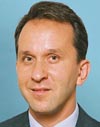INSTITUTIONS failed to ask right questions

Schmidt: steered clients clear
Many people had a sense that something was not quite right with Bernard Madoff's investments, writes Martin Steward, but chose to ignore the signs
Wealthy clients of private banks have been among the biggest losers in the $50bn (€40bn) so-called ‘Ponzi’ scheme fraud, allegedly perpetrated by Bernard Madoff Investment Securities, the broker-dealer group founded by the ex-Nasdaq chairman. Clients of Austria’s Bank Medici and Switzerland’s Union Bancaire Privée (UBP) have been particularly badly hit, although customers of many other wealth managers have ended up with products that appear to have exposure to Madoff funds in their portfolios. “A lot of people either saw or got a sense that something was fishy, but thought, ‘He’s probably front-running – but he’s front-running for me’,” says Jacob Schmidt, CEO of hedge fund advisory firm Schmidt Research Partners, who steered his clients clear after he did due diligence on Madoff feeder funds in 2003. “What kind of attitude is that? I can understand that a private individual might like that idea, but I cannot accept that from institutional investors.” UBP is the world’s second biggest hedge fund investor and its due diligence team is respected across the industry. It channeled $700m of client cash into Madoff feeder funds, but kept proprietary capital out. The Swiss bank says it will no longer invest with self-administered or self-audited funds, a set-up which is not unusual in the US. “The move to independent administrators has been in the offing for a long time,” says Hans Hufschmid, CEO of GlobeOp, which has picked-up the first independent administration mandate from 18-year, $11bn hedge fund group Millennium Management. “Now investors are looking at self-administration and saying, ‘I just cannot afford to take that risk.’” No guarantees A simple name on a prospectus is no guarantee that administrators are not merely printing out investor statements at month-end; most administration contracts still allow service providers to source pricing from managers, and only full administration involves reconciling cash, trades and positions truly independently – preventing frauds which involve no trading at all. Furthermore, much of the due diligence effort focused on feeders – generally independently-administered and Big-Four audited – rather than the underlying brokerage account with Madoff Securities itself. But, as Mr Schmidt says, the administration issue was only one of many red flags. The feeders had stock and option certificates which looked genuine, he recalls. There was no independent check on this, but feeder-level service providers accepted them at face value. However the premises were fortress-like, and when he finally got into the office, Mr Schmidt says he witnessed some bizarre behaviour: he was forbidden to make photocopies and staff became “very unhappy” when he tried to take notes. “I didn’t understand it - there was nothing unusual about the statements,” he recalls. Mr Madoff’s strategy was simple - timing moves from US Treasuries into the S&P100 (hedged with a split-strike collar). To return 10 per cent a year with such freakishly-low volatility he would have to be “the best trader ever,” as Mr Schmidt puts it, and there were those suspicious enough to try and model his historical returns. Markov Processes International ran the numbers in 2006, and the only asset they found correlated with Mr Madoff was the Bayou Fund – which started creating false returns after its real strategy went south in 1998. UBP told its investors that Mr Madoff’s “perceived edge” was his order-flow knowledge as major broker/dealer. But where there are doubts concerning an audit and administration regime, secrecy and uncanny returns, due dilligence can follow up with quantitative analysis. And there were definitely doubts. UBP told investors that it identified non-segregation of investment, brokerage and custody functions as a risk but “found comfort” in Madoff’s status as a “reputable broker/dealer subject to routine SEC and FINRA regulatory audits”. Amber Partners, a hedge fund rating agency, suggests the non-segregation issues, the lack of a Big Four auditor, the refusal to provide clients with elec-tronic access to accounts (and physical access to offices) were all red flags. “I can’t believe that these institutions don’t have the expertise,” says Jérôme de Lavenère Lussan, managing partner at hedge fund due diligence consultant Laven Partners. And none of the feeder funds probed too deeply into why a manager would give away this terrific alpha for free. “The guy’s making 12 per cent a year and you’re getting paid 2 and 20 on it,” says Mr Lussan. “You’re not going to ask too many questions, are you? That’s a problem across the entire asset-management industry.”




